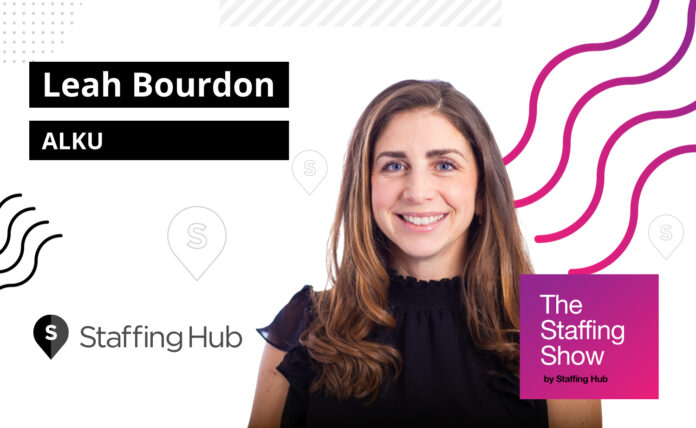
On this episode of The Staffing Show, Leah Bourdon, VP of Talent at ALKU, talks about the growth and exciting developments in the company over the past 12 years. She talks about the specialized focus of ALKU and how the company places consultants in specific areas including healthcare, IT, life sciences, technology, and government. She also reflects on the company’s philosophy of hiring entry-level talent and her own life lessons in viewing confidence as a buildable skill.
David Folwell: Hello everyone. Thank you for joining us for another episode of The Staffing Show. Today I am super excited to be joined by Leah Bourdon, who’s the Vice President of Talent at ALKU. Leah, thanks so much for being on the show today. Super excited about our conversation. To kick things off, could you tell us a little bit about who you are and how you got into staffing?
Leah Bourdon: Yes, of course. Thank you so much for having me, David. I’m definitely excited to have the conversation with you. So again, yeah, Leah Bourdon, Vice President of Talent at ALKU. I started at ALKU 12 years ago, so I was one of four recruiters actually when we started.
Folwell: Oh my God.
Bourdon: Yeah, so it is insane to see how much we’ve grown over those past 12 years.
Folwell: How many recruiters do you have now?
Bourdon: Probably around 150.
Folwell: Okay, so you’ve seen a ton of growth.
Bourdon: Yeah, yeah, we’ve grown a lot and it’s been super exciting. So I oversee the talent pillar at the company, which consists of talent acquisition, training and development, as well as our intern training program.
Folwell: Awesome. That’s really great. And can you just tell me a little bit about who is ALKU and what makes your agency different?
Bourdon: Sure. So ALKU is a specialized staffing company. We are focused on placing consultants in very niche specific jobs across the country, and we’re focused in four specialty areas. So healthcare, IT, life sciences, technology and government.
Folwell: Awesome. And do you think your specialization is kind of at the cornerstone of what makes the agency unique? Or what are some of the things that you guys do differently and that have helped kind of drive the growth that you’ve had over the years?
Bourdon: Yeah, that’s a good point. I think definitely it’s our specialization and we go after very high-level mission-critical projects. And so those types of projects really need someone who is a high-level type consultant and they’re hard to find. So the way our business is set up is each brand has specific recruiters and account managers who focus only on that specific type of technology, for example. And so they become experts in that area. So they really have the knowledge of all the best people to get for those positions.
Folwell: That’s great. So really deep specialization in each area to make sure that the recruiters know exactly what they’re doing, and that makes a lot of sense. And I know that there were some conversations before about this concept of specializing by dividing and the idea of “Al-Crew.” Could you just elaborate on what that is a little bit?
Bourdon: Yeah, sure. So the Al-Crew is really anyone who works at ALKU, just our fun way of identifying ourselves. So someone new comes in, we say, “Welcome to the Al-Crew.” And then so specializing by dividing is something that we’ve done from the start. So like I said, when I started 12 years ago, we were really working on one or two types of technologies, and so we figured out we could split those in two, then I would become an expert in one of them, and we can just really grow those specializations from there. As you become more of an expert, you realize where other splits can happen. It gives opportunity for a lot of people at the company. If we were all in one division, there might not be as many leadership roles, right? But because we’re specializing by dividing and breaking off, we’re identifying the next best people and the best leaders to manage those groups. So we’re giving opportunity as well as growing the business.
Folwell: And at what point or how do you know when it’s the right time to divide out? It sounds like there were some trigger points where you’re like, “Okay, we need to create a new division for this.” There’s an opportunity to share a little bit about how you identified that moment.
Bourdon: A lot of times it’s the people at the desk level. And because they’re experts on the type of technology or whatever division they’re working in, they’re speaking to consultants and they’re getting all that marketplace information, and they might be hearing over and over and over about something new or something that those consultants are hearing that, “Hey, maybe we should take a look into that.” So that kind of information really does flow from the desk level through leadership, and we trust the information that they’re getting and then we look further into it and we’re able to do a lot of splits that way.
Folwell: No, that’s awesome. And I know it sounds like you guys have a name for the Al-Crew for kind of the organization, what’s the culture like at ALKU?
Bourdon: So if you ask anyone, everyone knows our motto, is “have fun working hard,” and that is truly what we try to do every single day. Being on the phones, we’re in sales and staffing. Everyone listening to this podcast understands that when you get down to it, you’re on these calls battling call by call, day in and day out, and it’s kind of boring, right? So we try to make it as fun as possible, and that has a lot to do with our culture, the types of people that we hire, the opportunities that we give them.
People are really looking for career opportunities and we really truly try to focus on personnel development, and growing the people will grow the business. We also focus a lot on giving back to the community as well as providing safe spaces for our employees inside of work. So that is kind of a switch that we’ve made over the last few years. We’ve started employee resource groups. We have a lot of giving back opportunities. We have volunteer time off, we do things with, specifically, mass mentoring partnership in Massachusetts, and we’ve raised as a company almost a million dollars during the time we’ve worked with them. Yeah. So…
Folwell: That’s great. So it sounds like you got really excited people there, a really good culture. You’ve also mentioned that you have a really good internship program, and part of your hiring strategy seems like it’s a little bit unique as well. Could you elaborate there as well?
Bourdon: Yes, for sure. So we hire almost exclusively entry-level people. And I think one specific thing that truly does set us apart is we are looking for certain characteristics when we’re hiring people. We hire all personality traits and we want to provide people a good opportunity when they’re here, especially for career growth. And one story from an intern that I have heard recently is that we had an ALKU representative at an event at a school, and this intern who was hired from us had said, “It was such a great experience meeting you guys because you asked what I was interested in as a company, what I was looking for and what I wanted my career to look like. And every other company was asking me, what’s your GPA and what’s your major?”
Folwell: Yeah, that’s right.
Bourdon: Right? So we don’t care what major you are because everyone here came from something different. I was a government and women’s studies major in college and never thought I would be in staffing. So we truly focus on their experiences and what they want.
Folwell: And you must have pretty rigorous training programs if you’re doing the entry-level only. Have you built those up over the years or what does that look like?
Bourdon: Yeah. Yeah, so we do have, you mentioned our internship program. So we are trying to hire more people from the internship full-time than not, right? So I think this year we’re going to be close to 60% of our full-time hires will have had an internship. So we work with them throughout the school year and give them good experience and train them up so they can hit the ground running when they start full-time.
Folwell: That’s great. And we’re going to switch gears here a little bit. You guys were in the news recently about an investment from New Mountain Capital. What does this mean for ALKU and what does the future look like?
Bourdon: Yeah, that was super exciting. Still very, very new, and we’re just really excited to have our third additional partner to work with us. And I think in New Mountain Capital, we’ve definitely found someone, again who aligns in our goals and wants to see us grow and will help us do that the way that we have been doing that, right, and just help us to continue the success we’ve been on. So we’re definitely really excited to start working with them.
Folwell: Awesome. And then where do you expect ALKU to be three to five years from now?
Bourdon: Yeah, great question. We do work on five-year plans together, so we are looking over the next three years to definitely break through a billion dollars.
Folwell: Oh wow. That’s amazing.
Bourdon: Yeah. Yeah. We’re really hopeful. We’re hopeful we can be on track for….
Folwell: Four employees to a billion dollars. Four recruiters to a billion dollars.
Bourdon: Yeah.
Folwell: That’s quite the ride. Any lessons that you’ve learned personally in your career as you’ve gone through this growth? Anything for the audience that’s listening today that you’d be like, “Hey, I wish somebody had shared this with me earlier in my career and staffing would help me out a lot?”
Bourdon: Another good question, David. I think one of the things that I learned a little bit earlier on, but I do wish I had known earlier, was having more confidence. And I think that’s related specifically to sales and talking with people and being direct. I think when I was on the phone and starting out, it was I wanted to win people over and be nice and want them to want to talk with me, whereas I needed to get to the point and be direct and understand that being direct isn’t being mean. It’s just saying what you need and asking the question that you need the answer to. One of the things that the CEO Mark says all the time too is, “You can say what you mean and not be mean.”
Folwell: Yes.
Bourdon: Right? So kind of some of those things. And I think it’s all around confidence and just taking the chance and knowing you can do it.
Folwell: That’s great advice. And also, I just saw Lauren Jones on a panel recently and she talked about confidence. She said, “Confidence is a muscle and it’s something that you need to practice, you need to work on. It is not just something that you have or don’t have.” And she even recommended I think a confidence coach and a book as well. But I second that thought. We’re going to go into kind of the personal questions here to round things out, but what is one of the best or most worthwhile investments you’ve ever made? Could be an investment of money, time, energy, et cetera.
Bourdon: Definitely one of the most worthwhile investments I feel like I can’t pass by in talking about is just having a family. I have two kids, one on the way, obviously it’s very rewarding, very, very hard. But I think more than that, for me being a working parent, because that’s a huge investment, right?
Folwell: Yeah, absolutely.
Bourdon: Continuing my career at ALKU, being able to do so while I also have my family and raising my kids. I think just thinking about it has really been huge for me, and I’m so lucky that I can do both.
Folwell: That’s amazing. That’s amazing. What is the book or books you’ve given most as a gift and why?
Bourdon: So do people give books? I feel like we’re all on Kindle.
Folwell: Or Audible links that you’ve shared.
Bourdon: I know. Yeah, no. Good question.
Folwell: Actually I share links. I ask that question all the time. You’re the first person to say that. And I never give a physical book. I always am like, “Here’s the link, here’s a gift card.”
Bourdon: Yeah. So honestly, I just started avidly reading as an adult a few years ago, and I will admit I’m not reading a lot of staffing books. I’m on Goodreads. I’m reading a lot of just other types of bring me joy and stuff like that.
Folwell: That’s great.
Bourdon: Yeah. I say that I don’t give a lot of books away, but I definitely have a group of friends and we swap, “Hey, you should read this book, you should read that book, and go back and forth.” So last year I read 25 books, which was huge for me.
Folwell: Amazing. That’s great.
Bourdon: And maybe this year I’ll sneak a staffing one in.
Folwell: Great. How has failure or apparent failure set you up for later success?
Bourdon: So failure can definitely bring you down, right, and stop you in your tracks, or you can realize that you have to fail in order to be successful, in order to grow and learn. And I think that’s definitely one of the things. I don’t have a specific example, but just knowing that there’s definitely been failures that I’ve been able to overcome. And I think that’s just one of the things you have to think about is being able to figure out that it’s just a learning opportunity, and that you have to just get up and try harder. And me being such a competitive person, I played sports my whole life through college and I think that’s why I really love staffing because I was able to keep that competitiveness alive in my life. And so failure just makes me want to get up and work harder and make it happen. So I think that’s just proven well for me in my career, coming from one of four recruiters to being able to be a vice president at ALKU.
Folwell: That’s great advice. And I second that as well. Anytime there’s a major challenge on our team, we know it’s called a growth opportunity. It’s like, “Yeah, it doesn’t feel good, but this is how you’re going to grow the fastest.” So….
Bourdon: Exactly.
Folwell: I learn from it and move forward. Awesome. Well, it’s been super nice having you on, Leah. Any closing comments for our audience?
Bourdon: No, I really enjoyed our conversation today and I’ll be listening to more of your podcasts moving forward. I really like it. I love listening to podcasts so I’ll definitely be picking it up.
Folwell: Awesome. Well, thanks so much for being on.
Bourdon: Thank you.





